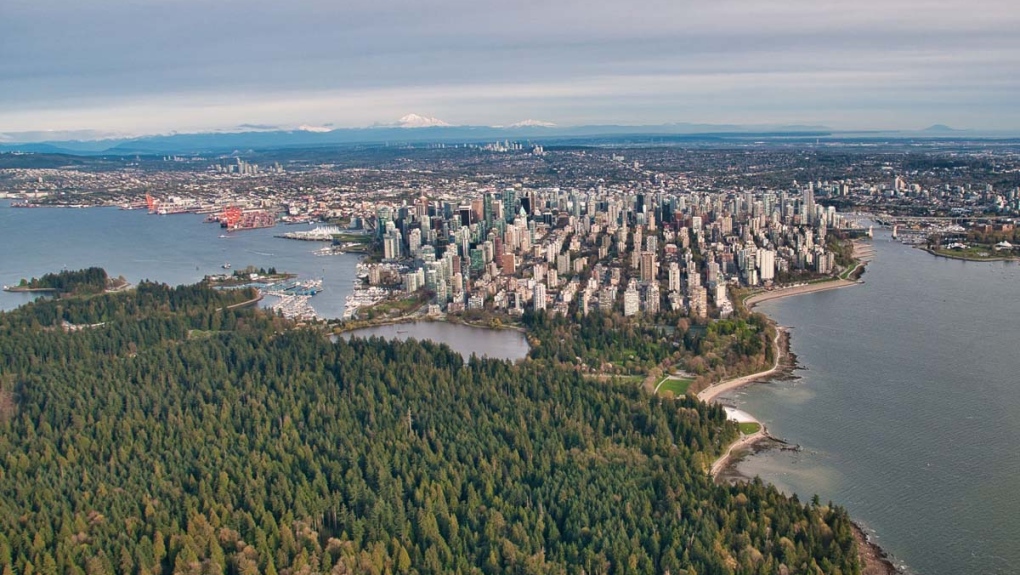First Nations flags raised in Stanley Park
 Stanley Park and the Vancouver skyline are seen from above in spring 2019. (Pete Cline / CTV News Vancouver)
Stanley Park and the Vancouver skyline are seen from above in spring 2019. (Pete Cline / CTV News Vancouver)
In what the Vancouver Park Board describes as a "small but meaningful gesture" toward reconciliation, the flags of the xʷməθkʷəy̓əm (Musqueam), Sḵwx̱wú7mesh (Squamish), and səlilwətaɬ (Tsleil-Waututh) Nations have been raised in Stanley Park.
Leaders from all three nations were present at a ceremony on traditional, unceded Coast Salish Territory Tuesday.
Musqueam Chief Wayne Sparrow took the opportunity to outline the violent, colonial history of the site.
"I am a direct descendant of the last Indigenous residents of Stanley Park. The violent and destructive removal of my family from their home at spapəy̓əqm is part of our history. The city’s park board was instrumental in deeming us ‘squatters’ and burning our ancestral villages to the ground," he said in a statement.
The park board's website notes that villages on the land were occupied for "thousands of years" until the residents were evicted in the 20th century.
Until 2017, the Canadian flag, the B.C. flag and the Union Jack flew at Brockton Point. The flagpoles were removed due to safety concerns, and new ones were installed in 2019. They remained empty while consultations were undertaken on replacing the flags.
In 2020, it was recommended that the flags be replaced with those of the First Nations, and the flags were gifted to the park board.
Plans to raise the flags in a ceremony were put on hold due to the pandemic and officially greenlit by the park board last year.
"Raising these flags encourages the broader community to learn more about our history, culture and traditions. We have always been here, and we will always be here," Wilson Williams (Sxwíxwtn), a councillor of the Squamish Nation. said in a statement.
Tuesday's statement notes that the Stanley Park Intergovernmental Committee and Working Group – which includes the three First Nations' elected and traditional leaders and representatives from the park board – is developing a 100-year "vision" for the space.
"This is a step towards balancing the cultures and histories of Stanley Park, a place of great significance to the three Nations and a site of colonial harms, and a signal to residents and visitors that this land is on unceded Musqueam, Squamish, and Tsleil-Waututh territories,” said Rena Soutar, the park board's manager of decolonization, arts and culture.
CTVNews.ca Top Stories

Ukraine's army chief reports tactical retreat in the east, and warns of front-line pressure
Ukraine's troops have been forced to make a tactical retreat from three villages in the embattled east, the country's army chief said Sunday, warning of a worsening battlefield situation as Ukrainian forces wait for much-needed arms from a huge U.S. aid package to reach combat zones.
Ontario to ban use of cellphones in school classrooms starting in September
Ontario is introducing a suite of measures that will crack down on cellphone use and vaping in schools.
Here's where Canadians are living abroad: report
A recent report sheds light on Canadians living abroad--estimated at around four million people in 2016—and the public policies that impact them.
Invasive and toxic hammerhead worms make themselves at home in Ontario
Ontario is now home to an invasive and toxic worm species that can grow up to three feet long and can be dangerous to small animals and pets.
Laurentian University to spend millions on recommendations in second budget post insolvency, but nothing new to reopen pool
Laurentian University's board of governors approved a budget of just over $201.7 million for the 2024-2025 fiscal year.
Murder charge laid after man falls to death from Toronto apartment balcony
One person has been charged with second-degree murder in connection with the death of a man who fell from a balcony following an altercation inside a Toronto apartment building.
Dozens in Italy give a fascist salute on the anniversary of Mussolini's execution
Dozens of people raised their arms in the fascist salute and shouted a fascist chant during ceremonies Sunday to honor Italian dictator Benito Mussolini on the 79th anniversary of his execution.
'Do not consume': Gift Chocolate recalled due to undeclared milk, soy
The Canadian Food Inspection Agency has issued a recall for a specific chocolate brand sold in Ontario and Quebec.
Zendaya tennis movie ‘Challengers’ scores at weekend box office
Zendaya and castmates Mike Faist and Josh O’Connor have been on a globetrotting press tour to get the word out about Italian director Luca Guadagnino's original film, which opened in 3,477 locations in the U.S. and Canada.






























